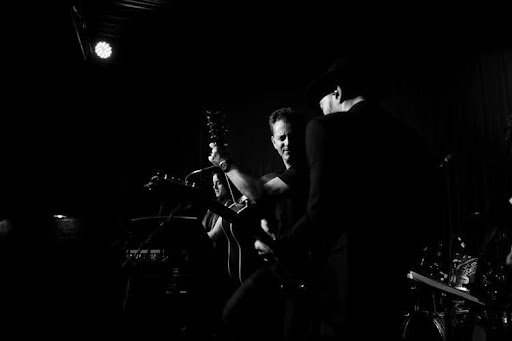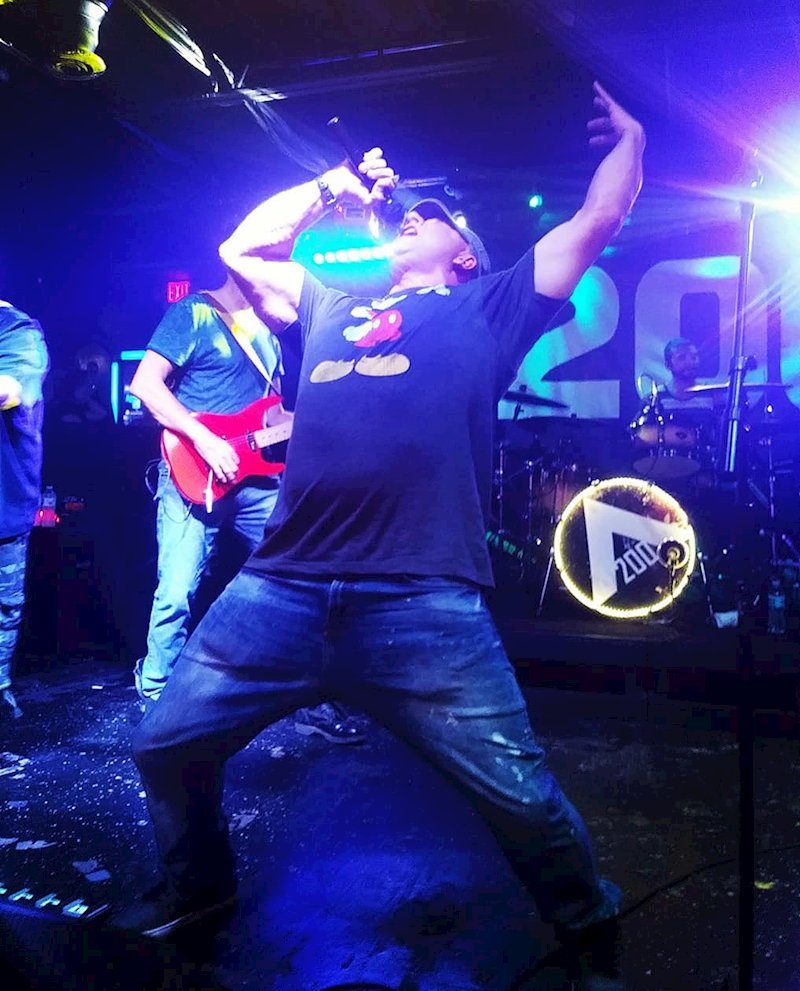In a new interview with John White of Mind Behind The Music, former MEGADETH bassist David Ellefson reflected on his journey — from teenage garage bands to thrash metal history, touring the world and reinventing himself with KINGS OF THRASH and ELLEFSON-SOTO. Speaking about his mindset when performing live, Ellefson said (as transcribed by BLABBERMOUTH.NET): “Put yourself in the audience position. Because when I’m at a concert — I was just at a big concert the other night; there was 10,000 people there. And, yeah, it was cool. It was exciting when everybody’s cheering and everybody’s part of it, and they were really into this artist and it was great. It reminded me of KISS and things like that, when I was younger. It was kind of a KISS of this younger generation. But the truth of it is, if I was the only person there, I would’ve had the same experience with that show because I felt like they were performing for me. So I think the trick as a performer is to perform for the audience of one, if you will. And the audience of one can be sort of your higher power, that little kid inside of you that just wanted to go rock, maybe it’s for your wife or girlfriend, maybe it’s for — whatever. I remember when my son was first born, I went on tour. I kind of felt like I was doing everything for him. Cause he was important to me, and I’d missed him. I was never home. I was always on the road, [when we were touring behind] ‘Cryptic Writings’ and stuff.
“I think when you’ve got that singleness of purpose to perform like that, I found that will always focus me, even if there’s 20 people or 20,000,” he added. “Because when you’re performing to a whole bunch of people, just the mood of the event can sometimes elevate the excitement, because of everybody’s sort of raising the bar around you — people are screaming, they’re singing, they’re whatever. So, performance situations, it comes back to what we talked about: read the room. And audience of one, I think, has always been a good philosophy.”
Elaborating on how he approaches his live shows, David said: “First of all, I always say a little prayer, even if it’s just, ‘Oh, God, please help me. [Laughs] You know what I mean?
“Music is sort of this divine calling that we have. And when you’re called, that means you’re being led — you’re not being driven, you’re being led. So even though you’re in a forward motion, the motivation behind it can be very different. If you’re driven, it could be, like, ‘I’m gonna fight against all odds.’ And that’s what it is for some people. And that’s fine. It’s not what it was for me. And it’s still not. To me, today, the phone rings, I say yes. They lead me to where I need to go, whether it’s a record company or a producer or somebody, or another musician calls and says, ‘Hey, you wanna write some songs?’ So I think knowing that it’s a divine thing, for me, in my last few decades, it’s been more about, ‘All right, God. How dare I go into this without bringing you along?’ [Laughs] It’s, like, ‘Hey, thanks for putting me here.’ And every gig is just as important as the one before. The big gigs are fun, of course — they’re cool; they’re great — but those little gigs where you’re just performing for a handful of people… The person at the hundred-seat club, they paid the same amount of money as the guy standing next to him, and they want to be entertained just like the guy next to ’em. So for performers, when we get caught up in, well, how much money do we make? Or, there’s not enough people here. Why are we playing this small little fucking shithole club. It’s, like, well, because that’s what you’re worth in that town. Maybe it’s an intentional underplay — it’s a warm-up for something bigger coming up. It doesn’t matter. But you’re there for a reason. And so get on with the reason, is how I always look at it.”
Ellefson, who grew up attending Our Savior’s Lutheran Church in Jackson, Minnesota, re-embraced his faith at the age of 25, after going through a 12-step recovery program.
When Ellefson later settled down in Arizona, he started a contemporary worship service at a church in Scottsdale. He called it MEGA Life, partially a play on MEGADETH. In 2012, Ellefson began studying for the ministry through an extension program of Concordia Seminary in St. Louis.
In an October 2019 interview with Photo Groupie, Ellefson was asked why so many heavy metal musicians are Christians when the genre is often seen as the devil’s music. He responded: “Well, to me, it’s real simple: Christianity is just doing God’s will and God’s will is whatever ‘to thy own self be true’ you’re wired to do. The good Lord, our creator, however you want to define Him, has given us each unique skills to play a certain role here in our time on Earth. I think that if you’re living out what those skills and gifts are you, then you’re doing God’s will. To me, it’s really that simple. I think religion has complicated that deeply, and I think that it has extra steps that aren’t necessary. I think anyone of us can find our creator in moments of quiet and silence, and that’s usually when we tap into that inner strength and inner resource. I’ve discovered that resource is ultimately God, because he’s the creator of darkness. If I pick up a guitar, and as loud as it may or may not be, whatever comes out is probably God’s will and gift for me.”
Back in 2012, Ellefson told the Great Falls Tribute that MEGADETH had no plans to incorporate its Christianity into its songwriting. “You can be a person who has faith and be principled and have an obedience to your creator and not have everything you say or do be a praise and worship song,” he said.
“That’s the misconception that if you’re a metal guy, you only sing about the devil and if you’re a church guy you only sing about the Lord. What a lame stereotype that is.
“The only reason we talk about [our faith] is because people ask us about it,” he added. “The MEGADETH tour isn’t some crusade. We’re not on some mission.”
Mustaine spoke about “spirituality” during a 2016 interview, telling Honolulu, Hawaii radio host Dave Lawrence: “A lot of people believe that I’m into religion, because I had said that I had become a Christian. So let me just say that religion’s for people who are afraid of going to hell, and spirituality’s for people like me who’ve been there. And I say that there’s a whole spirit world of stuff that… There’s good and bad in everybody and in all things.”
Those comments echoed what Mustaine said three years earlier in a chat with the Nashville Scene. He stated at the time: “I don’t think that my faith has anything to do with my lyrics. I try and keep religion out of it. Frankly, for me, I don’t believe in religion. I have a personal relationship with God and with Christ, and that’s it. I don’t push that on anybody; it’s private. I kind of leave it there. Dave‘s [Ellefson] real open about it.”
Ellefson was fired from MEGADETH by Dave Mustaine in May 2021, just days after sexually tinged messages and explicit video footage involving the bassist were posted on Twitter.
Shortly before Ellefson was dismissed from MEGADETH, he released a statement on Instagram denying all social media chatter that he “groomed” an underage fan. He also filed a report with the police department in Scottsdale, Arizona alleging unlawful distribution of sexually explicit images of him by unknown offenders.
During an October 2021 appearance on SiriusXM‘s “Trunk Nation With Eddie Trunk”, Ellefson wanted to address one specific “misconception” about him that had been repeatedly raised in the years since his explicit videos were posted online. He said: “There’s a misconception that I’m a pastor. I am not a pastor. I did a year of seminary, and they made it real clear, ‘If you are gonna continue at seminary, you need to quit MEGADETH,’ so I quit seminary to be in MEGADETH. And I remember telling my mom that, when she was still alive — God rest her soul. I said, ‘Hey, I withdrew out of seminary,’ in good standing, to continue being in MEGADETH. And she was actually very disappointed. She was, like, ‘You know what? MEGADETH is holding you back. That’s too bad. You should have stayed in seminary.’ Turns out maybe I should have listened to my mom; I don’t know. [Laughs] Of course, mom wants the best for you.
“Who knows? Whatever,” he continued. “I’m a rock and roller, man. I’m a founding member of MEGADETH. It’s who I am. It’s what I do. It’s part of my life. It’s part of my existence. So I have no regrets about any of that. But I think that was a misconception. People started throwing that around. And so I’ve never been an ordained pastor. Yes. I did explore that world for a time.”
David went on to say that there is a perception that people of faith must set a higher standard of how they live with and treat others. “It’s almost like you’re this entity that’s floating up toward the heavens: ‘Oh, he’s such a wonderful man. He’s a man of faith. He’s got his family. And then this happens.’ It’s, like, ‘What the hell is this?’
“I mean, look, admittedly I’ve sort of trained the public to think that I’m one of the more well-behaved rock stars out there, and for the most part I have been,” he continued. “But at the same time, and this isn’t to claim anything other than just, oops, shit happens. That is what it is.
“In the season that I was away from MEGADETH, in the 2000s, I got involved in other things in church, and raising my family, and blah blah blah, these things, and so by nature, I kind of became more of a suburban homebody — the dad guy,” David added. “And then I went back to MEGADETH in 2010. And the thing is to try to reconcile that you’re not one guy at home and another guy on the road, that you’re the same guy. And I think for anybody who spent any time on the road — whether you’re a rock star, a traveling salesman or whoever you may be — that is the challenge, and it’s a real challenge, to keep your life in order when every day your toothbrush is in a new zip code.”
In 2004, Ellefson filed an $18.5-million lawsuit against Mustaine, alleging the frontman shortchanged him on profits and backed out of a deal to turn Megadeth Inc. over to him when the band broke up in 2002. The lawsuit was eventually dismissed and Ellefson rejoined MEGADETH in 2010.
Ellefson was in MEGADETH from the band’s inception in 1983 to 2002, and again from 2010 until his latest exit.
Photo credit: Maciej Pieloch (courtesy of Napalm Records)











